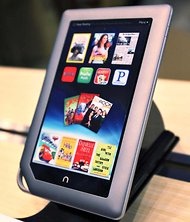 Shannon Stapleton/ReutersA Nook tablet.
Shannon Stapleton/ReutersA Nook tablet.
8:35 p.m. | Updated
Barnes Noble moved to shore up its struggling Nook Media division Friday, agreeing to sell a 5 percent stake to Pearson, a British publishing and education company, for $89.5 million.
In a sign of the headwinds the bookseller is facing, the company said in a regulatory filing that holiday sales were weaker than expected and that its Nook unit would fall short of projections for 2013.
The forecast underscores the difficulties Barnes Noble is having as it tries to build out its digital business and compete in a crowded market with giant companies like Amazon, Apple and Google. Sales for the first generation of e-readers have been dropping rapidly as consumers shift to tablets that can offer other forms of media like music, games and video. Just this week, Amazon was trumpeting banner sales of its Kindle Fire tablet over the holidays.
By contrast, worldwide shipments of e-readers fell by 36 percent in 2012, according to a report released this month by IHS iSuppli, a market research firm.
“The market’s growth is slowing down,” said James L. McQuivey, a media analyst with Forrester Research, referring to e-readers. “The easy customers have been snatched up. And the first customers are the best customers, who buy the most books. In the case of Amazon, you can compensate by selling merchandise to later adopters. Barnes Noble doesn’t have that luxury.”
Still, investors seemed to be cheered by the infusion of cash and the tie-in with Pearson’s large education and textbook business. That market has trailed trade books in switching to a digital format, and Barnes Noble could benefit as education books catch up. It could also try to make the Nook tablet a preferred device for educational content.
Shares in the company were up 4.3 percent, closing at $14.97.
Barnes Noble has tried to keep up with larger competitors by producing its own critically praised tablet and has claimed about 25 percent of the e-book market. But maintaining technological parity is expensive for a company that does not sell a broad range of similar merchandise. The chain has struggled under the burden of investing heavily in the Nook business over the last two years.
As a result, the company has sought partners for its Nook business for financial support. Last spring, Barnes Noble spun off the Nook division as a separate company and sold a 16.8 percent stake to Microsoft for $300 million. In theory, Microsoft will help promote the Nook through its Windows software, although a significant push has not yet emerged.
Peter Wahlstrom, a senior analyst with Morningstar Equity Research, called the move “a net positive” for Barnes Noble.
“Digital textbooks are a small, new niche market and a partner like Pearson can only help accelerate that market and that is important, but it is incremental,” Mr. Wahlstrom said.
Pearson’s investment in Nook is the latest in a series of recent steps the company has taken to focus on digital expansion and distribution of its education content and services. Higher education in the United States is already Pearson’s largest single business and in October it acquired EmbanetCompass, a provider of online learning services to North American colleges and universities, for $650 million.
That same month, Pearson agreed to merge its Penguin book publishing business — which does popular as opposed to educational books — with Bertelsmann’s Random House division, which further narrowed Pearson’s focus on educational books.
In a written statement, Will Ethridge, chief executive of Pearson North America, emphasized the advantages of the investment for the learning community. The deal, he said, “will allow our two companies to work closely together in order to create a more seamless and effective experience for students.” He added, “It is another example of our strategy of making our content and services broadly available to students and faculty through a wide range of distribution partners.”
Some analysts questioned whether Pearson was getting its money’s worth. In addition to its initial 5 percent stake in the Nook business, it has an option to buy another 5 percent. Pearson’s investment values the Nook business at $1.8 billion, more than double Barnes Noble’s market value on Friday of $883 million.
Mr. McQuivey acknowledged the potential of the education market but said it had too many variables to be seen as a reliable source of revenue.
“In the long run, if you can make the educational market explode and you get schools to give to tens of millions of children Nooks and put Pearson education content into the Nook, then it would be a long-range strategy for customers,” he said.
Instead, he said that the investment might be an effort by Pearson to help Barnes Noble stay in competition with Amazon.
Ken Doctor, a media analyst with Outsell, a research and consulting firm in Northern California, agreed that propping up a competitor to Amazon might be a motive, but he added that Pearson, with an investment of close to $90 million, was probably looking for more.
“That is why I think it is about preference and maybe really taking the Nook into an education leadership position,” he said.
Among the things Pearson might get for its investment, Mr. Doctor said, was preferential placement of its products on Nook home pages or even a say in how the device evolves over the next few years.
Article source: http://dealbook.nytimes.com/2012/12/28/pearson-to-take-stake-in-nook-unit/?partner=rss&emc=rss
Speak Your Mind
You must be logged in to post a comment.